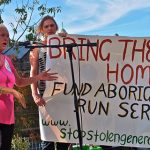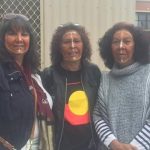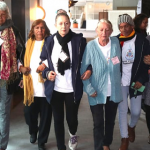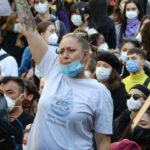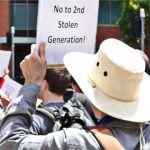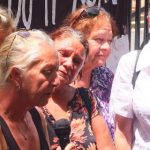Victoria Police Apologies for Aboriginal Child Removals, Yet the Practice Is Ongoing
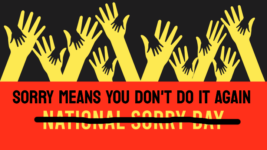
Victoria police chief commissioner Shane Patton last Friday apologised for the part state law enforcement played in the forcible removal of Aboriginal children, which was an apology that arose out of a suggestion from the truth-telling process undertaken by the Yoorrook Justice Commission.
“I am here with you today to formally and unreservedly apologise to survivors of the Stolen Generations and their families for the role of Victoria police, that we played in the forceable removal of Aboriginal children from their families, culture and Country.” Patton said on 24 May.
From 1864 through to 1992, Victoria police was one of several agencies in that jurisdiction, which were empowered to remove Aboriginal children from their families if the government deemed them to be either neglected or unprotected.
The apology came just two days before National Sorry Day, 26 May, which was established in 1988 as a day of remembrance for the Stolen Generations: the process that saw thousands of Aboriginal and Torres Strait Islander children removed from their families from the 1860s onwards.
But according to Independent MP Lidia Thorpe, the Victoria police commissioner’s apology hardly rings true when law enforcement agencies across the continent continue to assist with the forcible removal of First Nations children to this day.
Indeed, the situation is so dire at present, Thorpe posted last Friday, that one in nine Aboriginal babies are removed from their families in her state. And despite the official suggestion that the Stolen Generations came to an end last century, they continue at even higher rates now.
A present injustice historically noted
“For over 100 years, whether on our own initiative or in assisting other agencies and organisations, Victoria police contributed to the Stolen Generations by enforcing policies and laws,” Patton told the crowd gathered at the Aboriginal Advancement League building in Melbourne’s Thornbury.
“Victoria police was historically one of several agencies with legislative responsibilities for the management and movement of Aboriginal Victorians,” he underscored on 25 May.
Commencing in 1788, the British invasion and settlement of this continent was justified under the doctrine of terra nullius: that the land was either empty or without owners. And in the second half of the nineteenth century, the various colonies began enacting protection laws.
The first such law was the Aboriginal Protection Act 1869 (VIC), which permitted the removal of First Nations people from their land and then placing them on reserves, where all aspects of their lives were governed by police. And similar types of laws were passed in all other colonies.
A key reason for the removal of children that’s not explained in the official literature is that it serves to aid in the destruction of Aboriginal communities, which assisted in the usurping of their lands.
Under this system, thousands of children were forcibly removed from their families and often placed in boarding schools or with families to act in the capacity of servants, while others were removed and placed with a family who then raised them.
“I recognise that inadequate and incomplete recordkeeping directly contributes to compounding the impacts on Stolen Generations survivors,” explained Patton. And he added as there is no historical record, it’s difficult to give “a full and frank account of police actions in the removal of children”.
Ongoing stolen generations
Former Victorian Liberal MP Matthew Bauch was raised in foster care in 1980s Victoria. And in a 2022 opinion piece in The Guardian, he pointed out that while his experience in state care was excellent, for Aboriginal kids, this is hardly the case.
“About one in nine Aboriginal babies aged under one are taken from their parents by the state in Victoria,” Bauch explained two years ago. “That’s the worst proportion in the country, and more than double the national average.”
The then Victorian Liberal MLC further explained that over the four years prior, 33 Aboriginal children had died in foster care, and those who survive state care often flee due to being “sexually assaulted” or “subjected to other forms of violence”.
But the ongoing stolen generations aren’t confined to Victoria either. Despite then PM Kevin Rudd apologising for the Stolen Generations on 13 February 2008, community services the continent over were continuing then and now to engage in the mass removal of Aboriginal kids from their homes.
The 2024 Productivity Commission report outlines that on 30 June last year, there were 19,803 First Nations children under the age of 17 in state care, and this was compared with 25,522 non-Indigenous youths.
So, this means that 42 percent of all youth in state care nationwide are First Nations kids, which is starkly disproportionate when considering that Aboriginal and Torres Strait Islander children only account for about 5 percent of the nation’s overall youth population.
And in June last year, 29 percent of Victorian children in out-of-home care were First Nations kids, while in NSW, this rose to 44 percent all children in state care being Indigenous.
Sorry means you don’t do it again
Six years after Rudd delivered his apology, a group of First Nations women known as Grandmothers Against Removals (GMAR) staged a rally on 13 February 2014 in Sydney’s Redfern, outlining that more children were then being removed, than at any other point in Australian history.
Another outcome that Aboriginal child removals leads to, as then GMAR spokesperson Helen Eason told Sydney Criminal Lawyers during a 2018 interview, is that being forcibly removed from their homes increases the risk of Aboriginal youth ending up imprisoned in later life.
First Nations kids are currently being detained in child prisons at disproportionate rates, with 66 percent of all kids in NSW juvenile centres being First Nations, and when it comes to this state’s adult correctional facilities, 31 percent of those inside are Indigenous.
“This is a policy that has been set up for our people to fail since the beginning,” Eason said six years ago, which are words that still ring true these days. “That’s why it’s continuing. It’s not a new policy. It’s a continuing stolen generation.”
And as Thorpe underscored in her comments on the police apology last Friday, its redundant for law enforcement agencies, like that in her state, to be attempting to make amends in this manner, when its officers continue to overpolice, over arrest and then see First Nations people overincarcerated.


